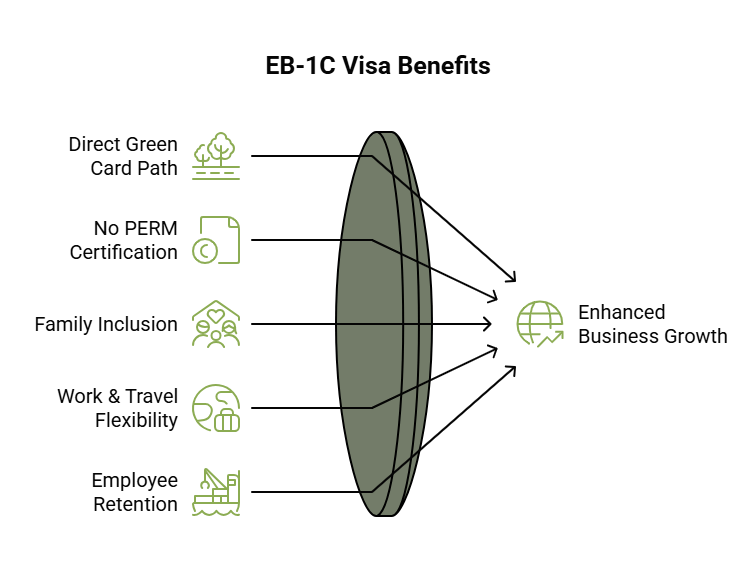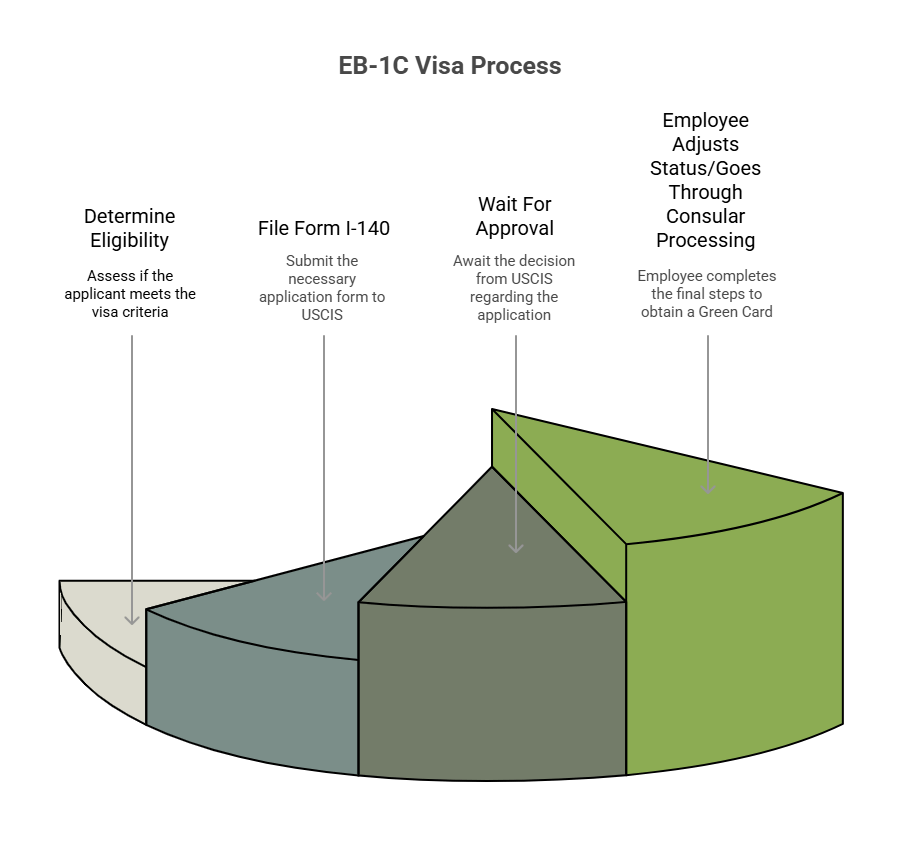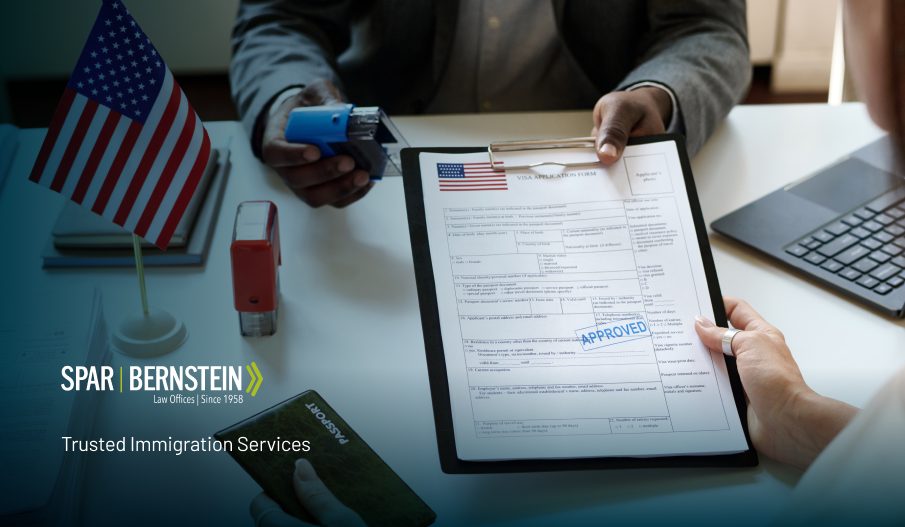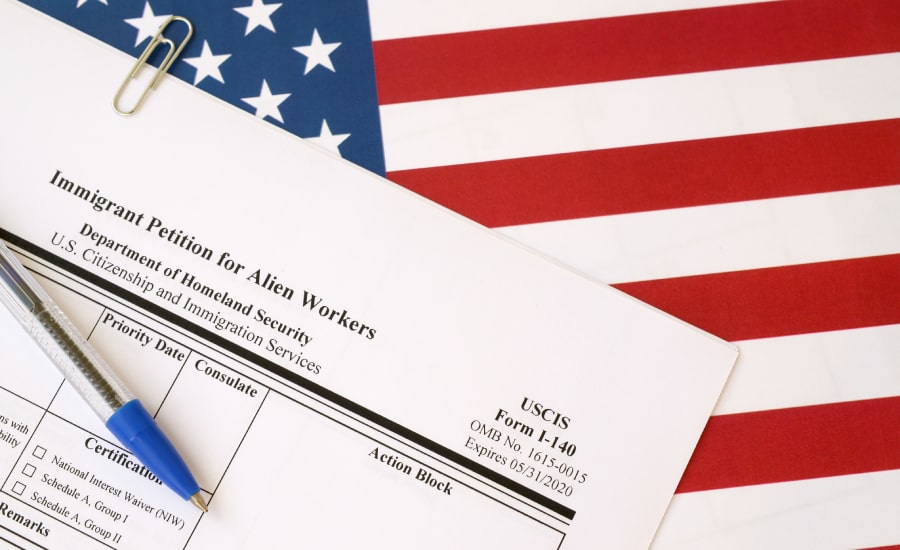

EB-1C Visa: Key Takeaways
- The EB-1C visa allows you to sponsor multinational managers or executives for permanent residency in the United States
- This visa offers a direct Green Card path without the need for PERM certification
- To sponsor an employee for an EB-1C visa, you must demonstrate a qualifying relationship and file Form I-140
- Average processing time is 13–18 months
Each year, the Unted States grants approximately 40,000 EB-1 visas to individuals who help drive business growth and innovation.
This number represents nearly 30% of all employment-based immigrant visas, including the EB-1C.
If you’re an employer looking to transfer managers or executives to your U.S. company, this guide is for you!
It will break down:
- What the EB-1C visa is
- How it compares to the L-1A visa
- The benefits for your business and employees
- Employer requirements and step-by-step process
- Typical processing times
EB-1C Visa Explained
The EB-1C visa, part of the EB-1 employment-based first preference category, is an immigrant visa that allows you to sponsor multinational managers or executives for lawful permanent residency (a Green Card).
This visa is popular if you are expanding your operations in the U.S.
Employees are not allowed to self-petition for an EB-1C visa.
EB-1C vs. L-1A
Both the EB-1C and L-1A visas allow employers to transfer managers or executives from a foreign office to a U.S. branch, subsidiary, or affiliate.
Here’s how the two visas differ:
- EB-1C visa is an immigrant visa category that directly leads to a Green Card provided the executives or managers meet the requirements.
- L-1A visa is a nonimmigrant (temporary) visa, part of the L-1 visa category, that lets a qualified manager or executive work in the U.S. for up to seven years. However, it does not provide a direct path to a Green Card.
Benefits Of The EB-1C Visa
The EB-1C visa offers many advantages for you as an employer and the multinational managers or executives you sponsor.
Direct Path To A Green Card
Your key employees can stay and work in the U.S. indefinitely without needing to renew a nonimmigrant visa.
No PERM Labor Certification
Unlike most employment-based Green Cards, the EB-1C does not require Permanent Labor Certification (PERM), which can shorten the overall processing time and ease paperwork.
Family Members Included
Employees approved for an EB-1C visa can bring their spouse and unmarried children under 21 to the U.S., allowing them to receive Green Cards, enjoy the benefits of permanent residency, and build their lives in the U.S.
Work & Travel Flexibility
With a Green Card, your employees can work for you long-term, travel internationally, and pursue U.S. citizenship.
Business Expansion
The EB-1C visa helps you expand and manage your company with trusted managers who already understand your team dynamics and business vision.
Employee Retention
Having a clear pathway to permanent residency gives long-term security for your employees and their families, making them more likely to accept an overseas transfer.

EB-1C Visa Requirements For Employers
As an employer, you must prove that:
- There’s a qualifying relationship between your U.S. company and the foreign entity, meaning it’s a parent company, subsidiary, branch, or affiliate.
- Parent/Subsidiary: One company owns and controls more than half of the other, has 50-50 joint control in a venture, or owns less than half but still has control.
- Branch: A U.S. corporation that’s part of the same company but in a different location.
- Affiliate: Companies owned and controlled by the same parent or the same group of people, with each owner holding the same proportion in both companies.
- The employee you want to transfer has worked abroad for at least one continuous year out of the past three years in a managerial or executive role.
- They will be joining the U.S. company in managerial or executive position.
- Your U.S. company has been doing business for at least one year.
EB-1C Visa Process
As an employer, you must follow several key steps when sponsoring your employee for an EB-1C visa.
1. Determine Eligibility
Confirm the employee meets the managerial or executive definition under immigration law.
2. File Form I-140
Fill out and submit Form I-140, Immigrant Petition for Alien Worker Submit to the U.S. Citizenship and Immigration Services (USCIS).
3. Wait For Approval
USCIS will review your petition, and, in case they need additional documents, you may receive a Request for Evidence.
Once the petition is approved, it’s time for the employee to take part in the process.
- If the employee is already in the United States, they may file Form I-485, Application to Register Permanent Residence or Adjust Status, to adjust their status and get a Green Card.
- If the employee is outside the U.S., they’ll need to go through consular processing with the National Visa Center and the U.S. Embassy or Consulate in their country. If approved, the employee and eligible family members will get lawful permanent resident status.

EB-1C Visa Processing Time
The typical timeframe to process Form I-140 for managers and executives is between 13 and 18 months.
The time may vary depending on USCIS workload, whether your petition is complete and well-documented, and consular processing wait times abroad.
Currently, there’s no premium processing for EB-1C visas, meaning you can’t speed up your petition.
To ensure your application is complete and accurate the first time and avoid delays, consider working with an experienced business immigration attorney.
Need Help With EB-1C Visas? Call Spar & Bernstein
At Spar & Bernstein, we know that your company’s growth and stability rely on key managers and executives.
Helping businesses of all sizes sponsor top international talent through the EB-1C visa, we’re here to help you bring the people you need for your daily operations.
Our knowledgeable attorneys will:
- Confirm your company’s qualifying relationship with the foreign office.
- Ensure the candidate meets all EB-1C requirements.
- Collect and prepare the necessary evidence.
- Fill out and file your petition.
- Help your employee with the adjustment of status or consular processing process, forms and deadlines.
We’ll protect your company’s interests and give your employees the security they deserve so they can settle in and help your business grow.
EB-1C Visa: FAQs
Can an employee switch from L-1A to EB-1C?
Yes, many employers start with an L-1A visa and later file an EB-1C when they’re ready to sponsor the employee for a Green Card.
Does the EB-1C require labor certification?
No, this visa category does not require a PERM labor certification, saving significant time.
Can my employee bring their family to the U.S.?
Yes, the employee’s spouse and unmarried children under 21 can apply for Green Cards as derivative beneficiaries.
What happens if my petition is denied?
If your I-140 is denied, you may be able to appeal or file a new petition. Working with our experienced and compassionate team at Spar & Bernstein will help you avoid potential issues and ensure the best course of action.













